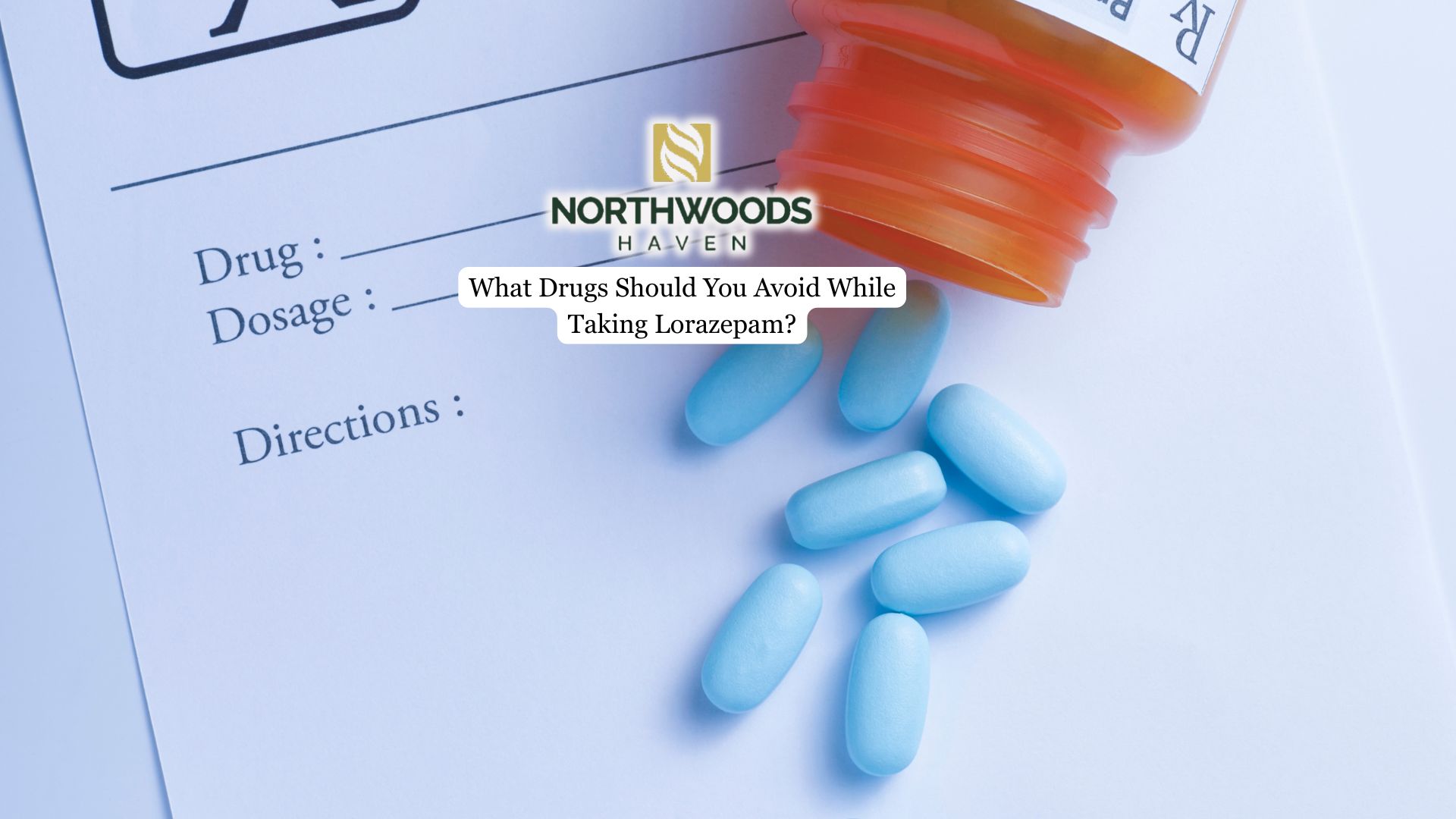Lorazepam, sold under the popular brand name Ativan, is a widely prescribed treatment for anxiety disorders and even alcohol withdrawal. Although highly effective in the short term, it must be used with caution because it can interact dangerously with a wide range of substances.
This article explores which drugs and substances should be avoided while taking lorazepam and why they may pose serious risks to your health.
Other Central Nervous System (CNS) Depressants
Lorazepam reduces anxiety, promotes relaxation, and can induce sleep by slowing activity in the central nervous system. However, when combined with other CNS depressants, such as opioids or sedative-hypnotics, this effect becomes dangerously amplified. Opioids like oxycodone or fentanyl act on the brain’s mu-opioid receptors, suppressing breathing and pain perception.
When taken together, the dual suppression of neural activity dramatically increases the risk of respiratory depression, overdose, and even death. Similarly, combining this medication with other benzodiazepines or sleep medications like zolpidem further intensifies sedation, leading to impaired motor control, memory loss, and a higher chance of accidents or overdose.
For those who find themselves misusing this prescription drug, seeking professional help through an expert Ativan addiction treatment program is an important step in preventing serious health consequences.
Antihistamines
Many antihistamines, especially first-generation ones like diphenhydramine (Benadryl) or doxylamine, readily cross the blood-brain barrier and block histamine receptors in the central nervous system.
Histamine is a key neurotransmitter responsible for wakefulness, so blocking its action induces drowsiness. When Ativan is taken alongside these medications, the sedation deepens considerably. This can result in slowed reaction time, poor concentration, and an increased likelihood of confusion or falls, particularly in older adults.
Alcohol
Alcohol is one of the most hazardous substances to mix with lorazepam. Both act on GABA-A receptors, meaning their effects stack in a way that is not simply additive but synergistic. Even moderate alcohol intake can produce excessive drowsiness, disorientation, or blackouts when combined with Ativan.
The combined impact on the brainstem can depress breathing and heart rate, creating life-threatening complications. This is why most medical professionals advise patients to completely avoid alcohol while taking this medication.
Antidepressants and Antipsychotics
Antidepressants and antipsychotics can also interact with this anxiety medication in complex ways. Tricyclic antidepressants, for example, possess anticholinergic and sedative properties that compound the drug’s drowsiness. Selective serotonin reuptake inhibitors (SSRIs) and serotonin-norepinephrine reuptake inhibitors (SNRIs) are generally safer but can occasionally heighten dizziness and impair concentration when combined.
Antipsychotics like quetiapine or risperidone also act as CNS depressants, meaning that pairing them with lorazepam may further compromise alertness, coordination, and cognitive functioning. These interactions do not necessarily make the combination unsafe in all cases, but they demand careful medical supervision.

Muscle Relaxants
Muscle relaxants such as cyclobenzaprine and carisoprodol act on the spinal cord and brain to reduce muscle spasms, often by depressing neural activity. Since Ativan already slows communication between nerve cells, taking these drugs together can lead to profound weakness, slowed reflexes, and an elevated risk of sedation-related accidents. For patients using both medications, close monitoring is critical to avoid dangerous side effects.
Anticonvulsants
Certain anticonvulsants, including gabapentin, pregabalin, and valproate, are commonly used for seizure disorders or nerve pain but also carry sedative properties. They act on calcium channels or GABA-related pathways, overlapping with Ativan’s mechanisms.
When combined, they can significantly impair cognition and increase the risk of respiratory depression. While doctors may prescribe these medications together in specific cases, the combination requires precise dosing and regular monitoring.
Herbal Supplements
Natural remedies are often perceived as harmless, but several herbal supplements can interact with lorazepam. Kava and valerian root both have sedative effects by influencing GABA transmission, which can intensify their calming properties to a dangerous degree.
St. John’s Wort, commonly used for depression, can alter the way drugs are metabolized by the liver’s cytochrome P450 enzymes. This may either reduce the medication’s effectiveness or increase its concentration in the body, depending on the individual. Because supplements are less regulated than prescription drugs, their unpredictable potency makes interactions with lorazepam particularly risky.
Long-Term Risks of Mixing Lorazepam with Other Substances
- Tolerance and dependence – the brain adapts to chronic sedation, requiring higher doses for the same effect.
- Severe withdrawal complications – sudden stopping may trigger anxiety, seizures, or life-threatening withdrawal symptoms.
- Cognitive decline – long-term use can impair memory, concentration, and decision-making.
- Higher overdose risk – especially when combined with alcohol or opioids, which intensify respiratory depression.
- Increased accidents and injuries – sedation and slowed reflexes raise the risk of falls and motor vehicle accidents.
- Organ strain – prolonged drug interactions may damage the liver, kidneys, and cardiovascular system.
- Development of substance use disorder – combining drugs increases the likelihood of misuse and addiction.
Final Thoughts from Northwoods Haven Recovery
Lorazepam can be very effective when used as prescribed, but it can also be risky when combined with other substances. Mixing it with alcohol, opioids, antihistamines, or other sedatives can make its effects much stronger, leading to poor judgment, slowed movement, and even dangerous breathing problems. Even some herbal products and over-the-counter supplements may change how it works in the body, creating risks people might not expect.
At Northwoods Haven Recovery, our specialized Ativan addiction treatment program in Minneapolis, MN, provides compassionate, outpatient care tailored to each individual’s unique needs. We emphasize safe detoxification, evidence-based therapies, and relapse prevention strategies that address both the physical and psychological aspects of dependence. Beyond immediate stabilization, we focus on equipping individuals with the skills and support necessary for long-term recovery, helping them rebuild balance, health, and resilience in their daily lives.



